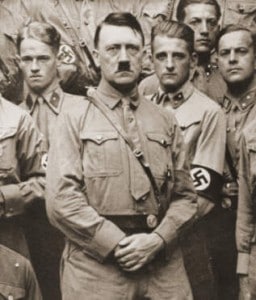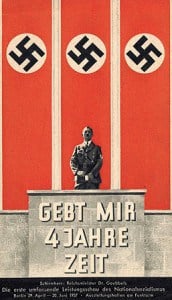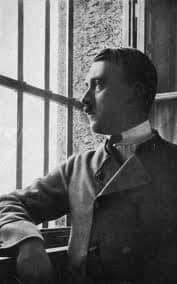As readers of any comment section on the Internet know, people are compared to Hitler all the time. In philosophy classes, students readily point to Hitler as the embodiment of evil — so much so, in fact, that there is a logical fallacy named after him: Reductio ad Hitlerum. Yet the astute student of history — or a bored googler — is hard pressed to find ‘Adolf Hitler’ and ‘Ignatius Loyola’ mentioned in the same sentence. The two, it seems, could not be farther from one another. And yet, I have found myself holding the two up for comparison.
Before you write to my superiors, allow me to explain.
* * *
Although their lives had radically different trajectories, there are some interesting parallels in their beginnings. Both Iñigo and Adolf were born into Catholic families, but their faith was of little importance in early life (for Hitler, it was of no importance at all). Both Ignatius and Hitler served their countries in battle, and were lauded for their heroism. After defeats in battles — Ignatius in Pamplona and Hitler in the failed Beer Hall Putsch in Munich — their lives radically changed. These headstrong young men each spent nearly a year in unplanned solitude. Hitler stewed in prison for treason after the failed coup. After his famous war injury (battle, cannonball, etc.), Ignatius spent many months recuperating in his family castle at Loyola, and continued his solitude in a cave outside of Manresa. During those periods, each of them worked out his emerging thoughts on life and the world. The fruits of their musings are two drastically different works: Mein Kampf (“My Struggle”) and what would become the Spiritual Exercises of St. Ignatius Loyola.
To my relief, the similarities end here. Hitler believed that humanity could achieve lasting earthly perfection: a twist on Nietzsche’s perfectable ‘super-man’ (Übermensch, to the rescue?). With the right support, Hitler thought that he could usher in a thousand-year peace for the German people. To arrive at this point, however, humankind must rid itself of its impurities — ideological, racial, religious, etc. — that threatened it from without: How perfect life would be for the beleaguered German people, if only it were not for the Weimar Republic…or the Jews…or the simpering Christian ethos that turns the other cheek, etc.
After World War I, Germany faced astronomic inflation rates, high unemployment, and a post-war guilt that crushed the people’s spirits. Hitler could identify the nation’s problems, and — in a populist maneuver — thought up quick-fix solutions that sounded eerily reasonable, even to our modern ears: Want health care, restored patriotism, no class distinctions, and jobs? Support us. We will save the German people! Hitler’s popularity began not from top-down force, but by offering straightforward solutions to common folks’ complex problems.
In The Gulag Archipelago, Aleksandr Solzhenitsyn writes: “If only there were evil people somewhere insidiously committing evil deeds, and it were necessary only to separate them from the rest of us and destroy them. But the line dividing good and evil cuts through the heart of every human being. And who is willing to destroy a piece of his own heart?” For Ignatius, the primary struggle for humanity is not to eliminate the perceived threats outside us, but to discern the warring desires within us. He recognized how easily his thoughts, intentions, and actions become tinged with pride, envy, greed. For Ignatius, too, the line dividing good and evil does not separate a saintly us from a culpable them. Rather, good and evil are quietly at war in the heart of every human being. When we aren’t paying attention, we unreflectively grasp for securities, power, comforts… and in the end we settle for the greater glory of myself. Ad Majorem Mei Gloriam.
Yet in the quiet moments spent at Loyola and Manresa, Ignatius realized that to live this way yielded him only hollow pleasure and dissatisfaction. True joy, strength, and freedom came from abandoning his own plans. Instead he chose to surrender his subtle interior scheming, and devote his energies to the greater glory of God. Ad Majorem Dei Gloriam.
Ignatius came to see how God labors in love to free us from our pride, even as we struggle to hold onto the reins of control. True power, the power of God, is revealed in sacrificial love and mercy; not in power plays, fear mongering, and (at its worst) mass extermination of peoples.
Hitler tragically writes, “The stronger must dominate and not blend with the weaker, thus sacrificing his own greatness. Only the born weakling can view this as cruel.” This flies in the face of St. Paul, who writes in the Letter to the Philippians that Jesus,
Though he was in the form of God, did not regard equality with God something to be grasped. Rather, he emptied himself, taking the form of a slave, coming in human likeness; and found human in appearance.
Saints Paul and Ignatius knew from their conversions that we are not — and cannot be — in total control of all of life’s struggles. This human vulnerability — and Hitler’s resistance to it — was the very fuel of his party’s rise. Where Hitler struggled to eliminate weakness, Ignatius struggled to accept his own. Ignatius aimed to pattern his life on the life of Jesus Christ, who willingly became poor and weak. Only in this, he realized, could he share in God’s great glory. We cannot perfect humanity by eradicating the weak, and we do not become divine by fashioning ourselves into gods.
* * *
The jarring asymmetry of this comparison — Hitler and Ignatius — lies not in the breadth of their reach, but in the source of their strength. Hitler’s solitary reflection bred a hatred and self-absorption that led to catastrophic evil. The lesson of history is simple: never underestimate the destructive power of a small mind and a fear-driven heart.
For Ignatius, solitude with God led him to become the man through whose weakness God’s glory sings forth — five hundred years later — still beautiful, true, and good. Ignatius writes, “those who go about to reform the world must begin with themselves, or they lose their labor.” Still today, we honor and celebrate Ignatius’ surrender to God. We see the great effects of Ignatius’ response around the world: in thousands of Jesuit schools, retreat houses, social ministries, outreach to this in need — and even a Jesuit pope.
And yet…in a twist of irony, St. Ignatius Loyola would probably hate that we revere him as much as we do; and that’s because in the end, it was never about Ignatius. It was about turning one’s life over to God and serving God’s people. And that fact might help to explain the ongoing magnetism of the Society of Jesus and its mission throughout the world, some five hundred years later.
+ Saint Ignatius of Loyola, pray for us.








